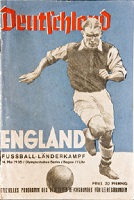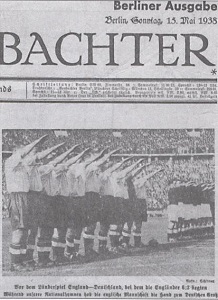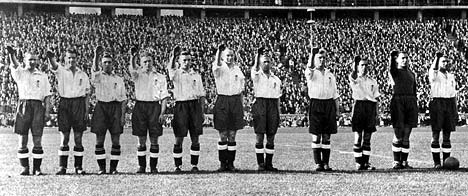
 This
match is remembered as much for the England team's rending of the Nazi
salute during pre-game ceremonies in Berlin's packed Olympiastadion as it is for
the result, a thumping for the Nazi regime's sporting pride and joy.
It
was Germany's last match before
the World Cup
1938 Finals
in France in June, and they were full of confidence on the strength
of a 16-game unbeaten streak that had seen them go through 1937 with an
opening draw and then 10 straight wins, albeit that record was inflated by the level of the opposition they faced. Sepp Herberger had become
their second coach in September 1936, replacing Otto Nerz, and the only losses Germany had
incurred since he took charge came in his fourth and fifth matches in
October 1936, to Scotland in Glasgow 2-0, and to the
Irish
Free State in Dublin 5-2.
This
match is remembered as much for the England team's rending of the Nazi
salute during pre-game ceremonies in Berlin's packed Olympiastadion as it is for
the result, a thumping for the Nazi regime's sporting pride and joy.
It
was Germany's last match before
the World Cup
1938 Finals
in France in June, and they were full of confidence on the strength
of a 16-game unbeaten streak that had seen them go through 1937 with an
opening draw and then 10 straight wins, albeit that record was inflated by the level of the opposition they faced. Sepp Herberger had become
their second coach in September 1936, replacing Otto Nerz, and the only losses Germany had
incurred since he took charge came in his fourth and fifth matches in
October 1936, to Scotland in Glasgow 2-0, and to the
Irish
Free State in Dublin 5-2.
Germany
had become even stronger because the annexation of Austria in
the Anschluss of 15 March 1938, just two months before the meeting with
England,
gave them the pick of the many fine players who had performed for
Austria, perhaps Europe's strongest national side during the early 1930's
and still a tremendous force, although Germany had beaten the Austrian Wunderteam 3-2 in the third place match at the World Cup 1934
Finals in Italy. After the Anschluss led to
Austria's withdrawal from the
1938
World Cup Finals the month before this
match--Germany
notifying FIFA that Austria no longer existed--FIFA offered England
a bye into the competition, but
England rejected the invitation.
According
to Chris Nawrat and Steve Hutchings' The Sunday Times Illustrated History of
Football, England were determined that Germany should not benefit from the Anschluss in this
match and obtained an agreement that the German team would not include any
Austrian players on the condition that Aston Villa would play a friendly match
the next day against a combined German and Austrian team. Nonetheless, one of the players Germany lined up for this match, Hans Pesser,
who
scored Germany's third goal, had been an Austrian
international.
The
Nazi rulers regarded the match as a wonderful opportunity for political
propaganda, and the German team undertook preparations that were quite
extraordinary for the time, two weeks of intensive training in the Black
Forest. In contrast, per their usual practice then, the England team,
arriving just after the close of a typically exhausting league season, played
without any special training sessions. The English players were also far less
experienced in international play than their German counterparts. Only
captain Eddie Hapgood and Cliff Bastin had made more than 10 international
appearances. Two, left half Don Welsh and center forward Frank Broome,
were making their debuts, and inside right Jackie Robinson, who had made his
debut a year earlier in an 8-0 victory over Finland, was earning only his second
cap. Inexperience counted little on this day, however; Broome scored once
and Robinson twice.
Before
the match, at the direction of the
British Ambassador to Germany,
Sir
Neville Henderson, and with the support
of Football Association Secretary Stanley Rous,
who would serve as FIFA President from 1961 to 1974, the England
players
joined in the Nazi raised-arm salute as the German
national anthem was played
and Nazi leaders Göring, Goebbels, Hess and von Ribbentrop watched.
Some accounts say the English players did so reluctantly, but others
maintain the fuss did not arise until the British press made it an
issue. In any event, England then set about dismantling a very good German team,
although sweltering
heat
eventually slowed them in the second half.
Left
winger Cliff Bastin, England's most experienced forward and
longest-serving player, opened the scoring with a well-placed volley at 16
minutes, but Germany pressed and equalized four minutes later through
inside right Rudi Gellesch. England then quickly took command of the
match. Germany needlessly gave away a corner from which Robinson
gave England the lead again at 26 minutes. Two minutes later Welsh
sent a defense-piercing pass through to fellow debutant Broome for
England's third goal. The fourth came a few minutes before half-time
from a wonderful solo effort by Stanley Matthews, who controlled a high
ball superbly, beat three German defenders and fired past the German
keeper. But as the half ended goalkeeper Vic Woodley's failure
to clear the ball properly allowed young German center forward Jupp
Gauchel to narrow the gap to two goals.
Early
in the second half, Robinson restored England's three-goal lead with a low
drive that veteran German goalkeeper Hans Jakob did not expect.
Broome missed a great chance for his second goal when he got by left back
Reinhold
Münzenberg, but sent his shot straight at Jakob. With less than 15 minutes left,
Pesser reduced the gap once again when he seized on confusion between
Woodley and right back Bert Sproston to score Germany's third. But
England were not to be denied their three-goal victory margin. With
10 minutes left, the little inside left Len Goulden struck a
tremendous shot from 30 yards that went in just under the crossbar
and tore the netting away from it.
The
result surely demoralized the German team. The next month in Paris, they
managed only an opening round 1-1 extra-time draw against Switzerland and went
out to the Swiss in the replay, 4-2. A little more than a year later
England and Germany were at war.
 The career statistics of
the players who took the pitch that day demonstrate the toll World War II took on their
playing careers. England played no official internationals in the seven
years between May 24, 1939 and September 28, 1946. Of this England team,
only Stanley Matthews wore the England colours following the war, and he was
never again the international goalscorer he had been before the war. The
Germans continued playing internationals through 1942, but, expelled from FIFA immediately after the war in 1946, did not resume international play until
late1950. Of this German team, only Andeas Kupfer played internationally
after the war, and then
only once, in West Germany's single 1950 match.
The career statistics of
the players who took the pitch that day demonstrate the toll World War II took on their
playing careers. England played no official internationals in the seven
years between May 24, 1939 and September 28, 1946. Of this England team,
only Stanley Matthews wore the England colours following the war, and he was
never again the international goalscorer he had been before the war. The
Germans continued playing internationals through 1942, but, expelled from FIFA immediately after the war in 1946, did not resume international play until
late1950. Of this German team, only Andeas Kupfer played internationally
after the war, and then
only once, in West Germany's single 1950 match.
IN OTHER NEWS...
It was on 13 May 1938 that two convicted murderers were given
reprieves from their death sentences by the Home Secretary. 32-year-old
William Teasdale had strangled his wife, Ruby, in Clapham after she
confronted him with his new fiancée at a cinema, the night before.
27-year-old Stanley Martin had beaten a police constable, John Potter,
to death when he was disturbed after breaking into a cider factory at
which he worked, at Whimple, near Exeter. Both were commuted to life sentences, though it was
believed that Teasdale was released in the 1950s.